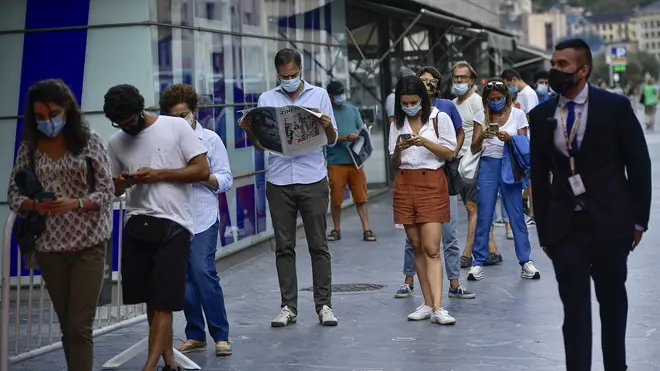
Tom Swarbrick 4pm - 6pm
19 September 2020, 07:05 | Updated: 19 September 2020, 08:57

Several European countries have announced increased coronavirus restrictions following an uptick in the number of Covid-19 infections.
The World Health Organisation has warned the rise in cases should serve as a "wake-up call".
Spain, Greece, Denmark and France have imposed more restrictive measures for cities with increased cases.
Infections have been climbing steadily across most of Europe over the last two months, however the increase is becoming more rapid, with more than half of European countries seeing an increase of over 10 per cent in the past two weeks.
On Friday, Madrid residents were told they cannot leave their neighbourhoods without a valid reason, parks will be closed and shops and restaurants will have to work at half capacity.
Cases are currently on the up in the Spanish capital, despite curbs on nightlife and limiting group interactions to a maximum of 10 people.
The country recorded 239 coronavirus-related deaths on Thursday, the highest single-day toll since cases began to rise again at the start of July.

Covid test demand is 'multiples' of UK's capacity, says Test and Trace chair
In France, further restrictions have been introduced in the city of Nice following an increase in infections.
Gatherings of more than 10 people have been banned in public spaces and bars have to restrict opening hours.
More than 13,200 new cases were registered on Friday, France's highest daily count since the start of the pandemic.
Elsewhere in Europe, Greece is introducing tougher restrictions in Athens and the surrounding areas.
From 21 September until 4 October, gatherings of more than nine people will be banned in the capital, with the exception of restaurants, bars and coffee shops.
Some 339 new infections were reported in Greece on Friday, with almost half of these in the areas with tougher restrictions.
Denmark has lowered the limit on public gatherings to 50 people from 100 and ordered bars and restaurants to close early.
Meanwhile, Iceland has ordered entertainment venues and pubs in the capital area to close for four days from 18 September.

Microbiologist says Covid has "gone too far" for a 2 week lockdown
Earlier this week, the World Health Organisation (WHO) said the number of COVID-19 cases in Europe are now exceeding those reported in March.
The WHO's regional director for Europe, Dr Hans Kluge, told a news briefing: "The September case numbers... should serve as a wake-up call for all of us.
"Although these numbers reflect more comprehensive testing, it also shows alarming rates of transmission across the region."